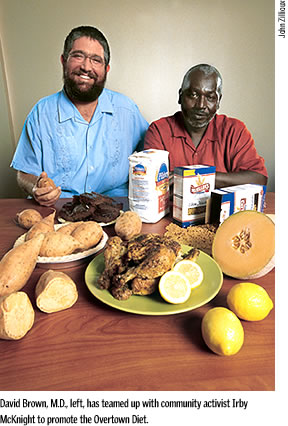 We all have to eat. That basic fact, combined with the
very focused work of physicians from the Department
of Family Medicine and
Community Health, Overtown residents, and community activists,
could help lead to the next new diet phenomenon. We all have to eat. That basic fact, combined with the
very focused work of physicians from the Department
of Family Medicine and
Community Health, Overtown residents, and community activists,
could help lead to the next new diet phenomenon.
David Brown, M.D., assistant professor
of family medicine and community health, is helping to
develop and promote what he has tagged the “Overtown
Diet.” Brown believes it could improve the quality and length
of life for Overtown residents. And, if the buzz of the last few
months continues, it could actually help to revive one of the most
neglected communities in South Florida.
“We felt the term Overtown Diet is kind of a sound bite,” says
Brown. “But this is much more than that. It’s really
about making smart choices.”
The basic idea is simple. Take traditional
recipes that have been prepared by African-American and
Caribbean families for years.
Alter the ingredients to reduce salt, unhealthy fats, and calories,
and you can still serve a tasty, affordable dish.
Brown does much of his work at the Jefferson
Reaves Sr. Health Center in Overtown. The center is also
the site for the department’s
family medicine residency program. Here, family doctors see 100
or more patients each day, most of them indigent. Many suffer from
chronic conditions at least indirectly related to their diets.
The center stands in the heart of Overtown.
A 75-block, traditionally African-American neighborhood,
it was once a vibrant community
of 40,000 residents. In the 1960s, however, construction of I-95
and I-395 forever shattered the community into three areas. Today,
barely 8,000 residents live there.
“We hope by involving the community we can help rebuild pride
in the region,” says Brown.
Anything positive is welcome, says Irby
McKnight, a 40-year resident and community activist.
“As African-Americans, we must change the way we eat,” he
says.
For his part, McKnight has been involved
in gathering traditional recipes around the community.
Nutritionist Jayme Kukowski, M.S.,
will help alter the recipes, striving to maintain taste while
using healthier, yet affordable, ingredients.
The community will eventually publish
an Overtown Diet cookbook, featuring about 100 dishes—with traditional recipes on the
left side and healthier alternatives on the right. The difference,
Brown hopes, will be obvious.
“Anything that involves sticking something in the deep fryer
most likely will be on the left side,” he says.
Brown is seeking to raise $70,000 in private
funding to pay for community participation in the preparation
of the book. He hopes
to have it published within two years.
Few, if any, believe the Overtown Diet
could ever overcome the South Beach Diet in popularity.
But, as a catchphrase, it is already
accomplishing what nothing else has done in the past 40 years. “It’s
giving people hope,” says McKnight. |